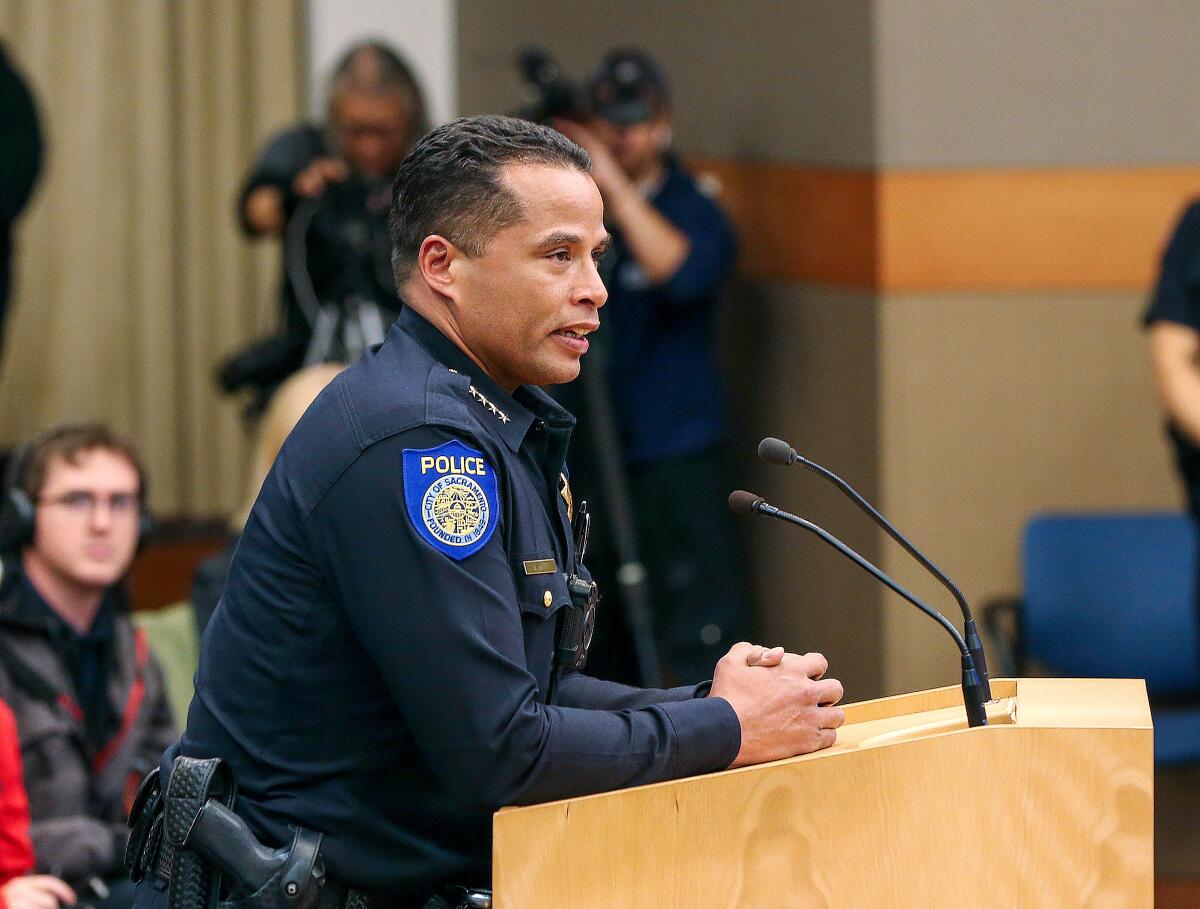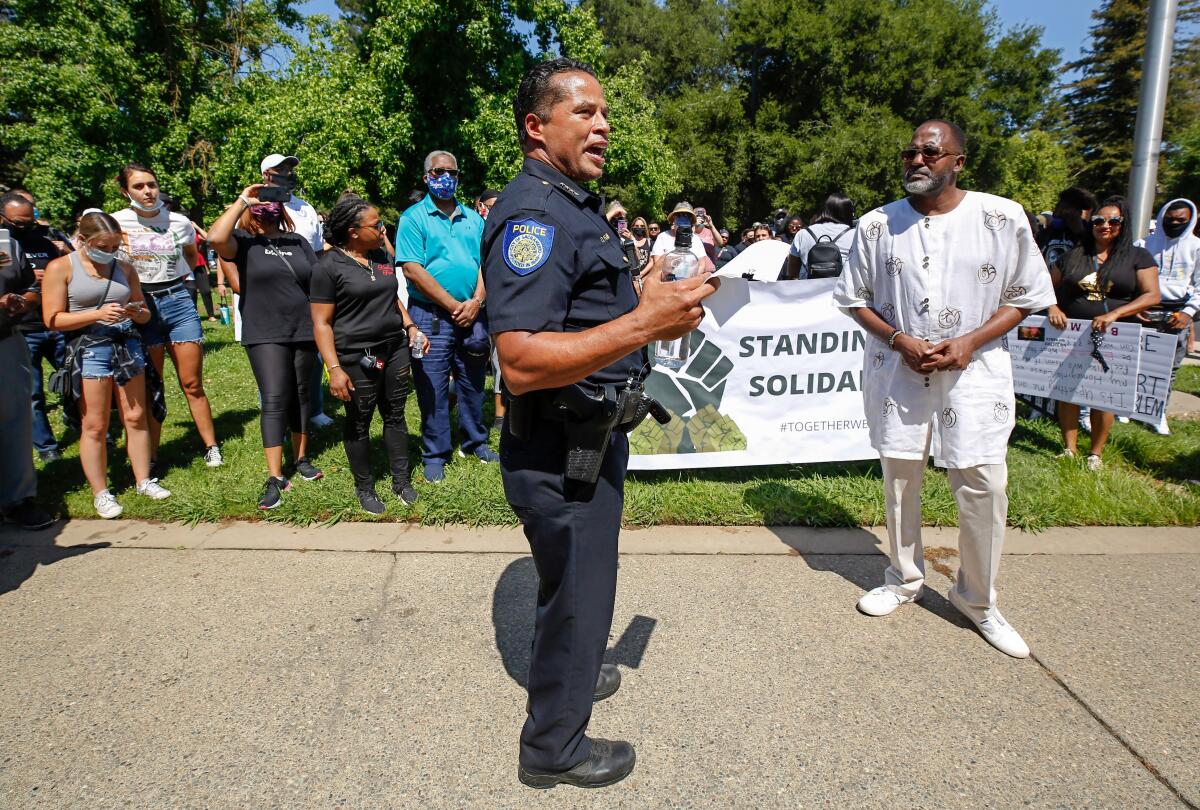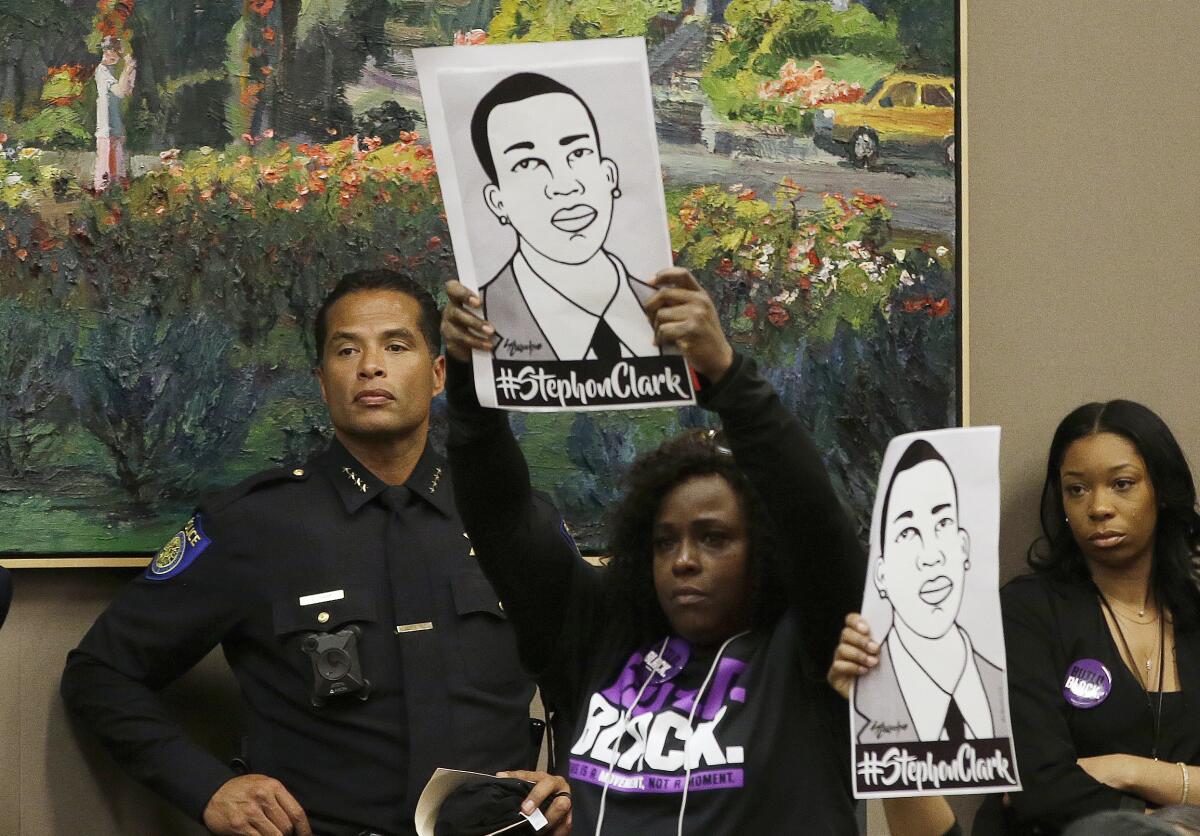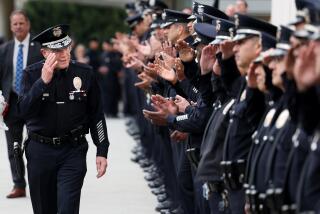Former Sacramento Police Chief Daniel Hahn on Stephon Clark, anger toward law enforcement

- Share via
Late last year, Sacramento’s first Black police chief, Daniel Hahn, announced that he would step down after four years in the position. The city subsequently revealed that he would be succeeded by Sacramento’s first female police chief, Kathy Lester, a 27-year veteran.
Hahn began working for the Sacramento Police Department as a community service officer in 1987, according to the Sacramento Bee. He eventually became a patrol officer and began his ascent. After working with teens at the department’s Criminal Justice Academy at Grant Union High School, he became a sergeant and later a captain managing the investigations unit.
In a conversation with The Times, he expressed joy at having had the opportunity to serve as the top cop in the city where he grew up. But he said there were tough times.
“I’ve had officers guarding my home while I’m not home” because of “death threats towards me and my family,” from people who “don’t know me, have never met me,” Hahn said.
When The Times asked Hahn if he liked the position, he said: “I’m very grateful that I’ve had the opportunity that the city manager and other folks trusted me with what turned out to be some really critical times.”
One of those critical times (if not the most) was a heavily criticized fatal police shooting in 2018. Police officers shot a Black man named Stephon Clark to death after mistaking his cell phone for a gun. He was shot at by a pair of officers 20 times, and struck at least seven times. The two officers involved did not face criminal charges. The incident caused weeks of protests and added heat to already simmering tensions between the police department and the local Black community.
“It’s a tragedy every time somebody loses their life,” Hahn said, reflecting on the case. He said that officers who shot Clark didn’t violate the law: “It’s been investigated at every single level of government.”
But he added that reforms that subsequently have been implemented might have led to a different outcome four years ago.
“If that same exact situation happened today, there’s a good chance those officers wouldn’t ever chase that person,” and would use a drone, he said. “Maybe Stephon Clark would still be alive.”
In a conversation last year before he stepped down, Hahn discussed generalizations the public makes about officers, the pressures that come with being a Black police chief, and more aspects of the Clark case. This is the second of three conversations with California police chiefs of color that The Times is publishing. The first was with Oakland Police Chief LeRonne Armstrong. A conversation with Fresno Chief Paco Balderrama will be published in coming days.
This conversation has been edited for length and clarity.

You announced that you would retire at the end of the year (2021), four years after being sworn in as chief. Did you like it?
The last four years? Yeah, absolutely, I think I not only liked it, but I’m extremely grateful that I was able to do this because I’ve lived my whole life in this community. I was born here, I’ve never lived anywhere else. And so I left for about six and a half years to be a police chief in Roseville, which is basically a suburb of Sacramento, about 12 miles east of here. And I remember we had one of the very controversial shootings, Joseph Mann, when I was in Roseville, here in Sacramento, and I do remember sitting in my office wishing I was here because that’s my city and I felt like I should be there when my city is going through some stuff.
You’ve done lots of things. You were a PIO. You served as the chief of another place. I’m wondering, are there any singular experiences that you had that just changed the way you thought about policing?
Oh, yeah, there are many in both directions. As a Black man who grew up in this city and now as a police officer, there have been several moments that inside the police department, you kind of go, ‘Huh, that’s why people feel the way they do about law enforcement.’ I grew up in a neighborhood that was probably one of the most crime-ridden neighborhoods in Sacramento. The first street gang originated in my neighborhood when I was in junior high. Numerous friends have gone to prison or been killed, and I was arrested when I was 16. I witnessed my first homicide in front of my house when I was nine. So I’m somebody that grew up in a neighborhood that didn’t care for the police too much. So I see it both as a kid growing up and now as a police officer.
There are many moments, but one, I had the opportunity to start a criminal justice academy at one of our inner-city high schools, Grant High School, and I ran and taught that for three years, got a teaching credential and, as a police officer, taught this program where you’re with kids every day. Just recently, one of my students, who is a teacher now in Atlanta, her mother passed away last year, and I’m one of the people she called. I picked her up from the airport. There’s a lot of rhetoric that says, ‘Police officers don’t help people. So we must switch to this or that, or a social worker responds to this or that.’ I have seen more times than I can count that that is flat-out not true.
Obviously we have to have people with their hearts in the right place to put on a uniform and be a police officer. And obviously, at times that doesn’t happen. So there’s people that have no business putting on a police uniform that somehow got through — that is absolutely true. But that is not a blanket statement for all or most police officers.
Were there any things that you wish you would have been able to do during your tenure that you didn’t quite get to?
Outside of just wishing things could go faster, I think anything that I look back and say, ‘You know, maybe that could have been different,’ is all usually around communication, especially in times of crisis or communication with the public. We’ve had a lot of communication challenges, if you will — some we got really well and some we got really bad. But the reason why I don’t usually say that was really horrible on the bad ones is because those bad ones made us learn and now we do it better. And a lot of that is because we have a whole new age of transparency when it comes to law enforcement. And so when it first started, we made a lot of mistakes, not with the transparency itself, but how we communicated that transparency. So now we really treat families — whether they’re homicide victims in third-party homicides in the community or officer-involved shootings — with dignity and respect, no matter what their background is, no matter what the suspect’s background is. But we had to get there.

A lot of media outlets covered the tragic case of Stephon Clark, which happened during your tenure. Do you have any parting thoughts about that case?
First and foremost, it’s a tragedy that Stephon Clark lost his life. It’s a tragedy every time somebody loses their life, especially to violence in our community, whether it’s a police officer — which we’ve experienced that in the last couple of years — whether it’s a community member at the hands of another community member, and especially when it’s at the hands of a police officer. That holds a certain space in our societal structure.
So to me, the first question we have to ask on any issue is whether it’s within the law and was it within policy, what the officers did. And I think it’s very clear that it was. It’s been investigated at every single level of government, and they’ve all come to the exact same conclusion that what happened was within the law. Now that does not remove it from being a tragedy. And it also doesn’t remove it from being something we still need to look at and go, ‘OK. That’s the first bar that we check, was it within the law? Yes.’ Then we go to the next step. It wasn’t within the law, and we’re doing something about the officers. But when it’s within the law, well, one is, the law needs to change. We’ve explored that in California. I think we’ve made changes to the law, but I don’t necessarily think that the changes we made are up to standard.
We created a foot-pursuit policy. We have drones now. So if that same exact situation happened today, there’s a good chance those officers wouldn’t ever chase that person, and use a drone instead. Maybe Stephon Clark would still be alive.
So to me, we often just stop at ‘was it legal or not,’ and we just spend our time arguing whether it’s legal or not. There’s still people to this day that say that shooting was not legal even though it’s been investigated by local, state and the FBI, and all have come to the same exact thing. So to me, the question isn’t whether it’s legal or not. The question is how tomorrow do we ensure that everybody is alive at the end of the day?
And we’ve had so many examples with training, with equipment, with our officers where there are people that maybe yesterday they might not be alive at the end of this call, but today they are because of the changes that have been made in our department, in many, many areas. So to me, it’s about are you better today than you were yesterday? Are people’s lives in the community better today than they were yesterday? And are your officers’ lives, as you know, healthy officers do better work. Happy, healthy officers do better work.
And so that’s what I take away from Stephon Clark. And I think to me, the Stephon Clark incident wasn’t a sign that we have something wrong. It’s a reminder that something’s wrong because we have a strong issue with bias and history in our country, whether some want to admit it or not. And it plays out either in a shooting. It could play out in bias — had a key role in a shooting, potentially, in some shooting. And even when it doesn’t have a role in the shooting, it always has a role in the aftermath. So why does half the country look at the same video and go, ‘That shooting was wrong, and you just killed that Black man because he’s Black?’ Another half of the country goes, ‘Nope, nothing wrong with that.’ They’re looking at the exact same video and it’s based on each group’s experiences, why they interpret what they see to believe what they believe.
I teach the history of our country all the way into the history of our city and how our neighborhoods were created, the way they were and how racism and bias played its role into that because it’s important that people know the truth about how things became the way they are. They are like how this neighborhood became in the way it was. It wasn’t always like that. It used to be a thriving, be a wealthy neighborhood, but decisions made here and there — redlining, housing discrimination, freeway construction — changed this neighborhood and destroyed the vitality of this neighborhood.
I just got this position at the L.A. Times writing the daily newsletter, and I can’t help but notice that it’s happened after a racial reckoning. But the thing is, I felt all of this pressure, being the first Black man to have this position. I felt like, Well, I have to be amazing. I have to innovate. I’m wondering if you felt the same sort of pressure when you first took on the position.
Yes, but I’m very, very, very comfortable in my skin, so even though the pressure was there, I wouldn’t say it had a ton of impact on me, but I imagine you’ve had some of the same experiences I had growing up. I’ve been told more than once by people I considered mentors, ‘You’ve got to be better than them.’ So you internalize that; if you want to get to where that guy’s getting, you’ve got to be better than them. You can’t be equal or just good. That’s a hell of an amount of pressure to put on somebody. And even though it might be true we should be trying to change the reason that’s true.
And so I would say, yes, I felt that pressure. But one, my mom is somebody that always just fed into me that: You are where you’re supposed to be, and you just be a humble servant and just work hard and have a good heart. And wherever you’re at, that’s where you’re supposed to be.
Some people, all they see is the shirt. And you’re not a human being; they blanket a whole group of people. But I’ve been told this to my face. I’ve been told on social media, ‘You don’t understand what it’s like to grow up as a Black man in Sacramento.’ And, typically, this is told to me by a non-Black person and oftentimes not by a man. And there’s been plenty of times I lift my arm up and look at the color of my skin and I’m like, ‘Come again? So now you know more about being a Black person than me, an actual Black person?’ And I grew up in this city, in Oak Park. I know exactly what it’s like.
And so it just goes to show you how radical people can get when they see a uniform or any other symbols, but in this case, you put on a uniform and all the sudden you’re not a person anymore. All of our Black officers get assailed the most on a skirmish line at a protest and belittled and yelled at, called Uncle Tom, like the whole group will center on the African American officer. Same group that says we need more African American officers are the ones that are telling the African American officer he’s a sellout and an Uncle Tom. You’re being disowned by your own community.
I remember there was a young, probably around 18- or 19-year-old white male kid from a suburb that yelled at one of our African American officers in the middle of a tense part of a protest. He yelled at them, “You are race traitor.” And I remember thinking — cause this is on body camera, that’s how I saw it. I didn’t see it live, but I remember thinking, ‘Is there anything more racist than a white person being the gatekeeper on whether a Black person is Black?’ That’s literally what that kid said. Like, it’s up to me to determine whether you’re Black or not, the person that doesn’t have to go through it. And I’m like, ‘This is the protester that’s supposed to be protesting for equity and equality, yelling at the Black person that they’re a race traitor, that they don’t know solely because he’s wearing a police uniform.’ And I’m just thinking, ‘Well, we got long ways to go because this is the person we’re holding up, that fight for equity.’ And it just became the judge, whether a Black person is Black or not. It harkens back to slavery and other things, quite frankly.
More to Read
Sign up for Essential California
The most important California stories and recommendations in your inbox every morning.
You may occasionally receive promotional content from the Los Angeles Times.











